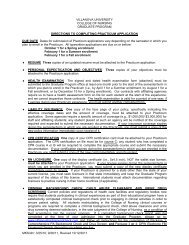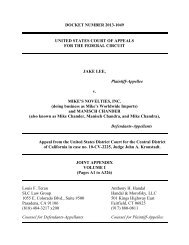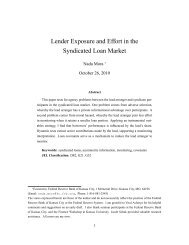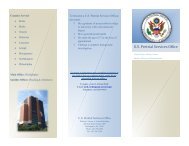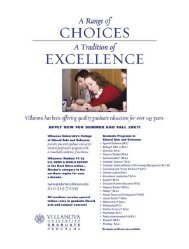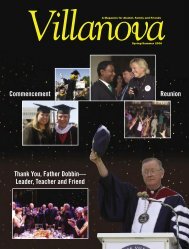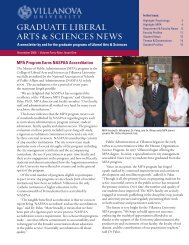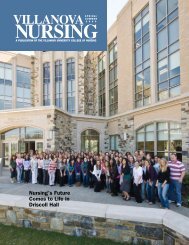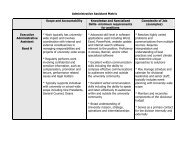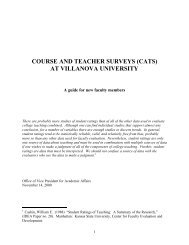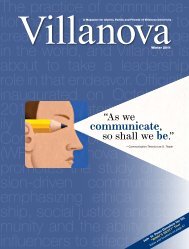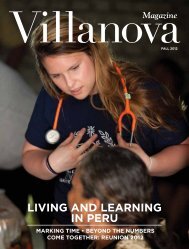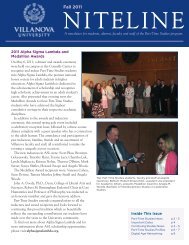Looking to the Future with Villanova's Strategic Plan
Looking to the Future with Villanova's Strategic Plan
Looking to the Future with Villanova's Strategic Plan
You also want an ePaper? Increase the reach of your titles
YUMPU automatically turns print PDFs into web optimized ePapers that Google loves.
“One of <strong>the</strong> things that make Villanova unique”<br />
Alumnus Michael Lamb, M.D., ’75 A&S<br />
has been profoundly affected by<br />
Villanova’s Augustinian heritage. “There is<br />
a <strong>the</strong>me underlying <strong>the</strong> Villanova education,<br />
and that <strong>the</strong>me is Augustine. It is one<br />
of <strong>the</strong> things that make Villanova unique.”<br />
As a physician, Dr. Lamb has a special<br />
interest in relating modern science <strong>to</strong> <strong>the</strong><br />
philosophy of Augustine. In 2001, he<br />
wrote <strong>the</strong>n-Villanova president <strong>the</strong> Rev.<br />
Edmund J. Dobbin, O.S.A., Ph.D., ‘58 A&S,<br />
proposing a lecture series on <strong>the</strong> <strong>to</strong>pic.<br />
“Many of Augustine’s ideas were also<br />
influential in <strong>the</strong> sciences,” he notes. “The<br />
seeds of Einstein’s relativity <strong>the</strong>ory are<br />
present many centuries earlier in Augustine’s<br />
writings.”<br />
Fa<strong>the</strong>r Dobbin was “immediately<br />
receptive,” Dr. Lamb recalls. “I got not<br />
only a response but also encouragement<br />
<strong>to</strong> push <strong>the</strong> plan forward.”<br />
Thus was born <strong>the</strong> Augustinian Institute’s<br />
Vivian J. Lamb Lecture Series on<br />
Augustinian Thought and <strong>the</strong> Sciences.<br />
Endowed by Dr. Lamb and named after<br />
his mo<strong>the</strong>r, it has brought many distinguished<br />
scientists <strong>to</strong> campus.<br />
“The philosophical approaches in science<br />
and religion share much in common,”<br />
he says. “I’m glad <strong>the</strong> series has<br />
continued <strong>to</strong> flourish. It could not have<br />
succeeded <strong>with</strong>out <strong>the</strong> attention and<br />
nurturing of Fa<strong>the</strong>r Thomas Martin.”<br />
New direc<strong>to</strong>r <strong>the</strong> Rev. Allan<br />
Fitzgerald, O.S.A., brings an<br />
international network of Augustinian<br />
scholars <strong>to</strong> <strong>the</strong> Institute.<br />
<strong>to</strong> carry on and enhance <strong>the</strong> good things<br />
that Tom Martin accomplished.”<br />
The Institute’s new direc<strong>to</strong>r looks forward<br />
<strong>to</strong> collaborating <strong>with</strong> <strong>the</strong> various<br />
academic departments and organizations<br />
that also sponsor Augustine-related lectures<br />
and events each semester on campus.<br />
“What we do and <strong>the</strong> speakers we invite<br />
will have a direct impact on <strong>the</strong> students.”<br />
In addition <strong>to</strong> making Augustine an<br />
integral part of <strong>the</strong> everyday lives of<br />
Villanovans, Fa<strong>the</strong>r Fitzgerald’s goal is<br />
<strong>to</strong> make <strong>the</strong> Institute “<strong>the</strong> place <strong>to</strong> study<br />
Augustine,” where people will come<br />
<strong>to</strong> reflect <strong>to</strong>ge<strong>the</strong>r on Augustine through<br />
<strong>the</strong> ages. It is a vision supported by<br />
Villanova’s president, <strong>the</strong> Rev. Peter M.<br />
Donohue, O.S.A., Ph.D., ’75 A&S, who<br />
wants <strong>to</strong> see <strong>the</strong> Institute grow in international<br />
stature.<br />
Fa<strong>the</strong>r Fitzgerald’s international experience<br />
and network of Augustinian scholars<br />
will play a major role in <strong>the</strong> latter. In addition<br />
<strong>to</strong> working and teaching in Rome, he<br />
received his S.T.L. degree from Lateran<br />
University in Rome and his S.T.D. degree<br />
from Institut Catholique in Paris. He is<br />
conversant in French, German, Spanish,<br />
Italian and English.<br />
Fellowships for<br />
international scholars<br />
In pursuit of increased international visibility,<br />
<strong>the</strong> next five years will be a period<br />
of major growth for <strong>the</strong> Institute, according<br />
<strong>to</strong> Barbara Wall, Ph.D., vice president<br />
for Mission and Ministry at Villanova.<br />
“Our Augustinian tradition has framed<br />
us as a University, and we need <strong>to</strong> put that<br />
front and center,” she says. “The Institute<br />
is part of Villanova’s attempt <strong>to</strong> claim our<br />
tradition, our distinctiveness and <strong>the</strong><br />
charism we offer <strong>to</strong> higher education.”<br />
To facilitate <strong>the</strong> growth of scholarship<br />
in Augustinian studies, <strong>the</strong> Institute<br />
will provide fellowships <strong>to</strong> Augustinian<br />
scholars from around <strong>the</strong> world. The<br />
St. Augustine Fellows, a new initiative<br />
designed <strong>to</strong> broaden <strong>the</strong> Augustinian<br />
conversation at Villanova and beyond,<br />
invites scholars <strong>to</strong> come <strong>to</strong> Villanova<br />
for a semester.<br />
It is envisioned that each St. Augustine<br />
Fellow will teach an Augustine-related<br />
course, present a seminar session on his or<br />
her research project while at Villanova and<br />
participate in sponsored lectures and conversations.<br />
The opportunity gives <strong>the</strong><br />
scholars time not only <strong>to</strong> do <strong>the</strong>ir own<br />
research but <strong>to</strong> be involved in a discussion<br />
on Augustine that is more intense and collaborative<br />
than in <strong>the</strong>ir home institutions.<br />
Their presence on campus will offer<br />
Villanova undergraduates even more<br />
opportunity <strong>to</strong> learn about Augustine and<br />
his impact on modern life.<br />
“The important thing is that <strong>the</strong><br />
Augustinian tradition is a living tradition,”<br />
says Dr. Wall. “It’s not so much about <strong>the</strong><br />
past as it is about how Augustinian thinking<br />
can enable us <strong>to</strong> be in dialogue <strong>with</strong><br />
our contemporary culture in ways that are<br />
relevant <strong>to</strong>day.”<br />
With its rich Augustinian heritage,<br />
Villanova seeks <strong>to</strong> play an even more<br />
important role in allowing <strong>the</strong> voice of<br />
Augustine <strong>to</strong> continue <strong>to</strong> speak effectively<br />
<strong>to</strong> <strong>to</strong>day’s world.<br />
“The ultimate goal,” says Fa<strong>the</strong>r<br />
Donohue, “is <strong>to</strong> make Augustine<br />
live <strong>to</strong>day.”<br />
Institute Sponsors<br />
International Web Site<br />
on Augustine<br />
V<br />
illanova’s Augustinian Institute is a<br />
sponsor of www.FindingAugustine<br />
.org, an online bibliographical collection<br />
concerning Augustine of Hippo and his<br />
legacy. The comprehensive, user-friendly<br />
site is <strong>the</strong> result of a unique international<br />
collaboration between institutions of<br />
higher learning in Europe and America.<br />
Some of <strong>the</strong> world’s leading scholarly<br />
books and articles about Augustine<br />
are organized according <strong>to</strong> a set of<br />
categories searchable by <strong>to</strong>pic or idea,<br />
making it easy <strong>to</strong> research almost<br />
anything about Augustine. The Web<br />
site is available in six languages: English,<br />
French, German, Italian, Spanish<br />
and Dutch.<br />
Summer 2010 7



